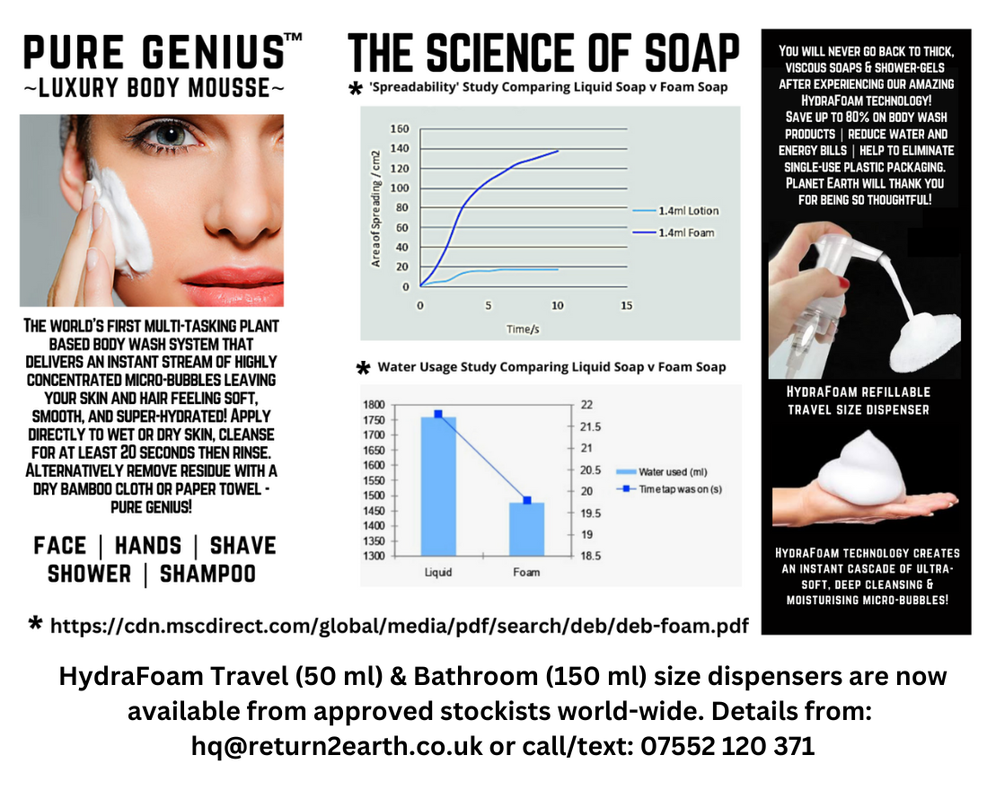BIG SOAP: TIME TO COME CLEAN!
This Special Report uncovers a secret the soap industry would rather you didn't know about!
If you use water-based cleaning products such as hand & body wash, shower-gel and shampoo then we recommend you conduct this simple experiment: Place a teaspoon of your usual body wash liquid or shower gel in a glass of tap water and wait to see how long it takes for this thick, viscous substance to completely dissolve in the water. Try swirling the mixture around in the glass to speed up the process ... still waiting? So what's going on?
Manufacturers of liquid soaps and water-based household cleaning products use a clever 'trick' that results in far more product being used than is really necessary. Nearly all hand/body wash, shampoo, shower gel and washing-up liquids contain chemical-based thickening agents which don't immediately dissolve in water. You've probably experienced a delay in creating a lather when washing your hands or taking a shower - particularly if you live in a hard water area. This delay encourages many people to add extra soap and water to their skin or hair until a sufficient amount of lather is created. But there is a solution, so read on ...
Big Savings Can Be Achieved On Your Soap, Water and Energy Bills!
Recent surveys discovered that Britain is one of the world’s biggest consumers of water, soap & energy per head of population, in fact, many households are spending hundreds of £££’s more each year than they need to! The following statistics were published by water.org.uk and illustrate typical water usage for everyday tasks. Naturally, the more water used, the more energy is required to heat the water ...
Hand Washing: 8 litres per bowl wash, and 30 litres per running tap wash on average.
Shower: The average shower-head uses 12 litres of water per minute, with power showers using around 15 litres. Given that the average shower taken is around 10 minutes long, that's up to 150 litres of water every time you shower! (waterwise.org.uk)
Bath: Filled about a third of the way up (which takes the water level over your belly button when you lie down) requires around 75-80 litres. Now let’s take a look at soap usage ...
Fact: thick, viscous shower gels and liquid soaps contain chemical agents that cause an unnecessary delay when the user attempts to create a lather, particularly in hard-water areas. In fact, many studies have shown that up to 50% - or more - soap and water is used when washing your skin or hair than is really required to complete the task. Currently, you probably use far more soap and water than is needed - and that means money is wasted each time you wash your hands, shampoo your hair or take a bath or shower.
The Solution:
An increasing number of budget-conscious consumers are switching to HydraFoam soap dispensers and refills . A typical household can save hundreds of £££'s each year with these premium quality personal care products that will amaze you! Each vegan compatible, hypoallergenic formulation is designed to work with our eco-friendly refillable HydraFoam dispensers that deliver an instant stream of soft, luxurious micro-bubbles.
DEB Group published the results of a trial that demonstrated significant savings in soap, water and energy usage when switching from thick liquid hand-soap to foam soap. The full report can be downloaded here:
https://cdn.mscdirect.com/global/media/pdf/search/deb/deb-foam.pdf
Brame Specialty Company in North Carolina USA conducted a study at a major University supporting over 20,000 students. They replaced the existing liquid soap with foaming hand soap and discovered that foam soap only uses 0.75 ml of product per hand-wash compared to 1.5 ml per hand-wash using liquid soap. This simple upgrade resulted in a 50% reduction in soap usage each year!
Big Savings For Business!
Organisations and consumers around the world are looking to reduce their environmental impact and save money by using less energy and natural resources. Whilst there are numerous ways to save on water usage, one simple solution could be the choice of soap in the washroom. Dr John Hines, R&D director at skin care experts Deb Group, announced how independent research showed that by using foam soap for hand washing, subjects use 16% less water than using standard liquid soap. Dr Hines goes on to state that "water consumption can be reduced by up to a staggering 45% when adopting a foam soap hand-washing technique of dispense, lather, then tap on - and rinse”.
For every 100 people employed, the use of foam soap for hand washing can equate to an annual water reduction of up to 56,000 litres. As warm water is usually used there are also savings to be made in energy use and CO2 emissions. Dr Hines also explains that an experiment conducted by Deb shows foam soap is eight times more spreadable than lotion soap and reduces the quantity of product required for an effective hand wash.
Interestingly, using less product does not equate to less efficacy as a further scientific study commissioned by Deb shows that there is no significant difference in the cleaning ability between a 0.7 ml shot size of foam soap compared to a standard 1.1 ml shot size of lotion soap, confirming that the same efficacy is delivered from foam using less product.
Further benefits explained by Dr Hines are that foam soap is more biodegradable than lotion soap as it does not require additional chemicals to thicken the soap - the lather is created by adding air inside the applicator. In addition, as foam soap delivers more hand washes from the same packaging compared to lotion soaps, it means that products have to be replaced less often, ultimately saving time and money and reducing packaging waste. Dr Hines concludes by stating "I would seriously urge any organisation to consider the use of foam soap to help reduce their environmental impact while simultaneously saving time and money”.


